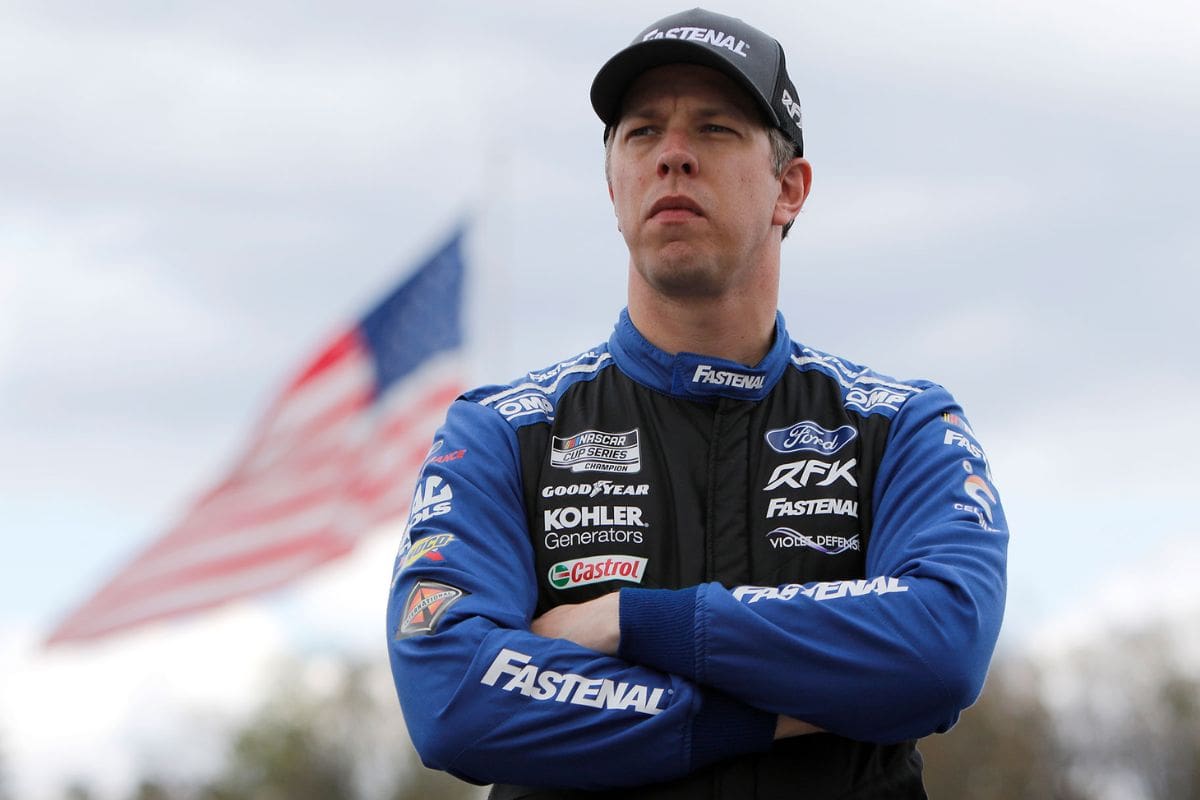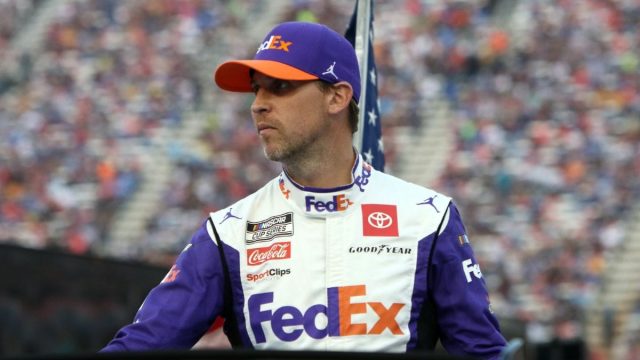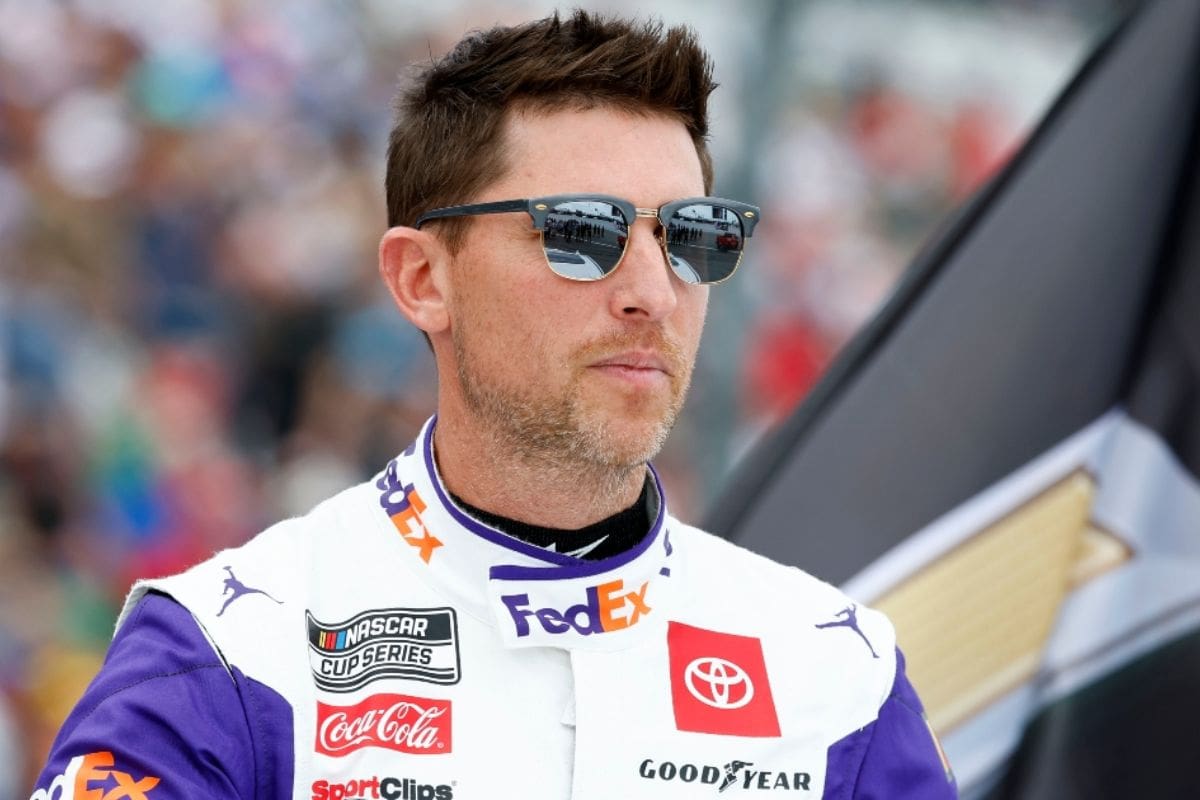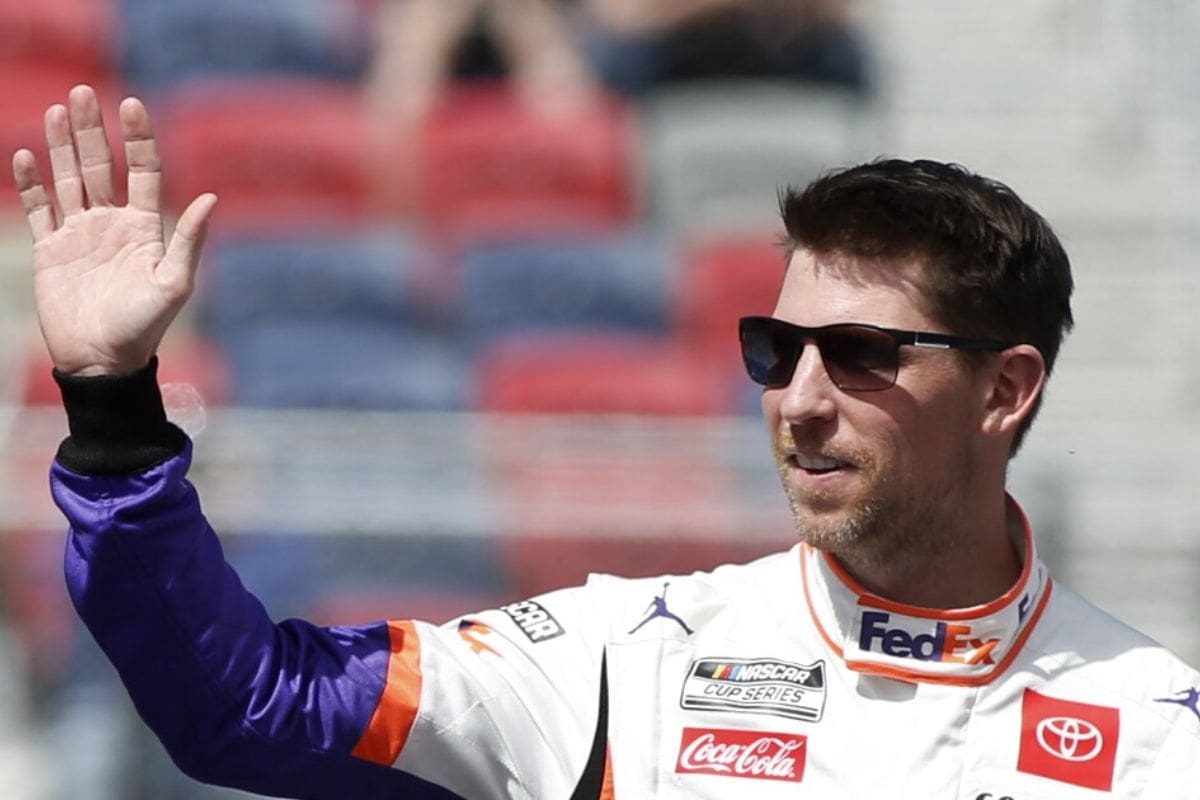Denny Hamlin’s Bold Move Against NASCAR’s Greed: Denny Hamlin‘s recent critique of NASCAR’s financial strategies marks a pivotal moment in the sport’s history, challenging the long-standing dynamics of a two-decade partnership. By advocating for equitable media revenue sharing and the establishment of permanent charters, Hamlin voices the frustrations of many within the racing community and risks considerable repercussions for his own team, 23XI Racing. This bold move could ignite a larger movement among stakeholders, raising questions about the future of NASCAR’s economic framework and the implications for its traditional alliances.
Key Highlights
- Denny Hamlin is advocating for fair media revenue distribution, challenging NASCAR’s economic policies perceived as favoring a select few.
- His push for permanent charters aims to provide stability and viability for teams, highlighting the need for mutual respect.
- Hamlin’s stance risks jeopardizing his team, 23XI Racing, indicating a significant shift in the sport’s economic landscape.
- The absence of NASCAR officials at key events signals a growing divide and potential isolation for 23XI Racing.
- Hamlin’s defiance may catalyze collective grievances among teams, potentially transforming NASCAR’s financial structure and long-term appeal.
The Economic Policy Protest
As the charter agreement’s expiration loomed, the mounting protests against NASCAR’s economic policies highlighted a growing discontent within the racing community. Over the past year, a chorus of disapproval echoed through the paddocks, as teams grappled with financial strains exacerbated by NASCAR’s rigid economic structure. The escalating costs associated with competing in this arena have left many teams struggling to survive, prompting calls for reform.
Despite months of fervent debate, NASCAR’s leadership has revealed only minor concessions to appease the discontented teams. This lack of substantial change has fueled frustration among stakeholders who perceive the sanctioning body as increasingly disconnected from the realities faced by smaller teams. The economic policies, which many regard as favoring a select few, have intensified the divide between the upper echelons of the sport and those aiming to remain competitive.
Most teams, feeling the weight of financial distress, have reluctantly acquiesced to the overarching authority of NASCAR. However, two teams, particularly including Denny Hamlin’s, have emerged as vocal dissenters against the status quo. Their defiance not only encapsulates the struggle for equitable treatment within the sport but also serves as a rallying point for others who share similar grievances.
As the expiration date of the charter agreement approaches, the protests highlights an urgent need for NASCAR to address these economic disparities, lest it risk alienating a considerable segment of its racing community.
Denny Hamlin’s Defiant Stance
Denny Hamlin’s defiant stance against NASCAR’s economic policies has positioned him as a pivotal figure in the ongoing struggle for fairness within the sport. As a veteran driver with an impressive 54 Cup Series wins, he has shifted from a celebrated racer to a formidable advocate for change, challenging the very organization that has been integral to his career.
We don’t have a charter agreement, we don’t owe the series anything. And they don’t owe us anything. So it goes both ways.” – hamlin
Hamlin’s willingness to potentially sever his two-decade-long ties with NASCAR highlights the gravity of his position. In his pursuit of a more equitable racing environment, Hamlin has brought attention to several critical issues:
- Media Revenue Distribution: He advocates for a more substantial share of the media profits for teams, arguing that their contributions deserve fair compensation.
- Charter Negotiations: Hamlin insists on the need for permanent charters, which would provide teams with stability and long-term viability in the sport.
- Team Autonomy: By asserting that neither NASCAR nor the teams owe each other anything, he stresses the importance of mutual respect and independence in their relationship.
Despite the risks involved, including jeopardizing the future of his own team, 23XI Racing, Hamlin remains resolute. His recent statements reflect a broader sentiment among team owners and drivers who are increasingly frustrated with NASCAR’s economic framework.
Given @23XIRacing and @Team_FRM reported hold out in signing the NASCAR Charter agreement and talk of teams being pressured to sign…what @dennyhamlin
says here is especially noteworthy. pic.twitter.com/hUwxV4yyxJ— Claire B Lang (@ClaireBLang) September 7, 2024
As he continues to advocate for change, Hamlin’s actions may catalyze a notable shift in the sport’s economic landscape, challenging the status quo in pursuit of fairness and sustainability.
NASCAR’s Response and 23XI’s Isolation
A noticeable rift has emerged between NASCAR’s leadership and 23XI Racing, particularly highlighted by the absence of NASCAR officials during the trophy ceremony for Tyler Reddick’s regular season championship win. This absence serves as a poignant symbol of the growing divide between the governing body and the team co-owned by Denny Hamlin. Hamlin’s recent comments underscore this divergence, suggesting that a considerable shift in mindset would be required for reconciliation.
“Look, can a charter deal get done? Yeah, absolutely it could. But again, someone will have to wake up and have a completely different mindset. I just don’t know that that is gonna be possible.” – hamlin
The isolation of 23XI Racing from NASCAR’s mainstream is becoming increasingly evident, as the organization grapples with its identity and future within the sport. The lack of engagement from NASCAR’s top brass raises questions about the potential for collaboration and mutual benefit in a sport that thrives on unity.
Hamlin’s candidness reveals an underlying tension that could have long-lasting implications for both parties. The absence of NASCAR officials not only signals a potential fracture in their relationship but also raises critical questions about the future of 23XI Racing in a sport increasingly perceived as driven by corporate interests. Both sides must navigate this complex landscape carefully to avoid further alienation and promote a sustainable future for NASCAR as a whole.

Brad Keselowski’s Perspective
Brad Keselowski offers a contrasting viewpoint in the ongoing tension between NASCAR and the teams, particularly in view of the recent charter agreement negotiations. While some, like Denny Hamlin and the 23XI Racing team, perceive the fixed deadline as a coercive threat, Keselowski adopts a more optimistic stance.
“Well, I don’t necessarily know where that’s coming from. Forced is a really strong term, but we are getting to a spot where it’s important to get these things settled.” – brad
His perspective reflects a nuanced appreciation of the complexities surrounding the negotiations. He acknowledges the significance of reaching a resolution while respecting the decisions of his peers.
In this situation, Keselowski underscores three key points:
- Respect for Choices: Keselowski commends 23XI Racing and Front Row Motorsports for their independent decision-making, suggesting a broader respect for team autonomy in a climate that feels increasingly pressured.
- Crucial Nature of Settlements: Contrary to the notion of coercion, he stresses the necessity of finalizing agreements. “We are getting to a spot where it’s crucial to get these things settled,” he notes, indicating that clarity is vital for all stakeholders.
- Value of Media Rights: The recent $7.7 billion media rights deal represents a notable opportunity for teams. Keselowski views signing the charter agreement as a tactical move to secure a larger share of these lucrative rights, which he believes justifies RFK Racing’s decision to proceed.
Future Implications
The ongoing negotiations between NASCAR and its teams are poised to have considerable future implications for the sport’s ecosystem. With media rights deals serving as the lifeblood of NASCAR’s financial structure, the decisions made during this shift period are critical.
The recent improvements in economic conditions have generated optimism among team owners, as highlighted by RFK Racing co-owner Brad Keselowski. However, Hamlin’s audacious defiance introduces a layer of complexity that could redefine the relationship between teams and the governing body.
“We’re glad that the economics are improved and to go with where the media landscape has moved. You know right now the sport lives and dies off the media rights deal. There’s no getting around that. So, when the media rights deal got done this winter, that was a big, big deal for the sport, and now you’re seeing the dominoes falling behind that, but don’t forget what the first domino is.” – brad
Should Hamlin’s stance gain traction, it may encourage other drivers and team owners to voice their grievances regarding NASCAR’s policies, potentially leading to a collective reevaluation of the economic framework that governs the sport. This could result in a paradigm shift, wherein teams demand greater transparency and a more equitable distribution of revenue from media rights deals.
Such changes could empower teams, fostering a competitive environment that prioritizes their interests over NASCAR’s unilateral decisions.
Moreover, the outcome of these negotiations may influence the sport’s appeal to sponsors and fans alike. A fractured alliance could deter potential investors, jeopardizing long-term growth. Conversely, if a more balanced relationship is established, it could attract new partnerships and enhance fan engagement.
News in Brief: Denny Hamlin’s Bold Move Against NASCAR’s Greed
Denny Hamlin’s challenge to NASCAR’s economic practices highlights a pivotal moment in the sport’s evolution. By advocating for equitable media revenue distribution and permanent charters, Hamlin amplifies existing grievances among stakeholders, potentially igniting a movement for reform. The reaction from NASCAR and the broader implications for team dynamics and financial structures remain to be seen. This critical juncture may herald a groundbreaking era in NASCAR, reshaping alliances and the economic framework of the racing community.
ALSO READ: Denny Hamlin’s Deadline Defiance: What It Means for Bubba Wallace’s NASCAR Future


